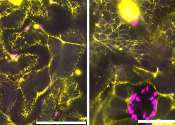Genetic analysis can be used generally to describe methods both used in and resulting from the sciences of genetics and molecular biology, or to applications resulting from this research.
Genetic analysis may be done to identify genetic/inherited disorders and also to make a differential diagnosis in certain somatic diseases such as cancer. Genetic analyses of cancer include detection of mutations, fusion genes, and DNA copy number changes.
Genetic analyses include molecular technologies such as PCR, RT-PCR, DNA sequencing, and DNA microarrays, and cytogenetic methods such as karyotyping and fluoresence in situ hybridisation.
Please note: This field is fast-changing, definitions are in flux, there is historical and contemporary overlap of the following categories, and phrases like "the results of genetic analysis" can indicate any or all of the following, depending on the facts of the matter being described.









